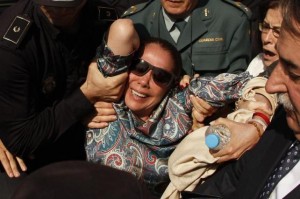
With comets illuminating the night sky above Madrid, and thousands gathering in the Puerta del Sol to demand the restoration of the Republic, with political parties and big business spectacularly mired in corruption and Isabel Pantoja collapsing in court – it’s not entirely surprising that coverage of Spain’s asparagus harvest has been relatively low-key.
But readers may have noticed that the cost of asparagus spiked recently. This was because heavy rain in Granada province, where about 80 percent of Spanish asparagus comes from, destroyed almost a fifth of the crop in the first quarter of the year, and the shortage sent prices through the roof.
Interestingly (if you look at things in a certain light), Germany has replaced France as the principal overseas market for Spanish asparagus. So it’s not just Spanish workers who are flocking to Germany: vegetables are doing the same.
German domination of the asparagus market may reflect a new trend. Post-war Europe was pretty much built on the premise that two words – Germany and domination – should not, if at all possible, appear in the same sentence. However, the eurozone crisis – almost by accident – has changed that. After decades of reticence, Berlin has become the undisputed big cheese of economic policy.
Still, since Germans are also Europe’s most inveterate travellers, some of the wealth that has gravitated north for structural reasons is gravitating south again for reasons of sea and sangria. Figures released this week by the EU statistical agency, Eurostat, show that 15 percent of Germans who travelled abroad in the latest reporting period travelled next door to Austria; 14 percent travelled to Italy and 12 percent opted for a longer journey but a better chance of sunshine and travelled to Spain.
Spain remains Europe’s largest single tourism market, the destination in 13 percent of all outbound trips made by residents of the 27 EU member states.
A seductive notion
King Juan Carlos famously got into trouble over an ill judged holiday in Botswana last year, but while the slump in the popularity of Spain’s royal family may have something to do with the conduct of individual family members, anti-monarchy momentum also reflects a tendency during periods of economic and social uncertainty to believe that the quality of government can be improved by changing the form of government.
This is evident in the relatively large numbers of people who turned out for last weekend’s pro-republic demonstration in Madrid and it is also reflected in Catalan President Artur Mas’s recent decision to commission a report on practical arrangements for an independent Catalan state.
The notion that society can be transformed through constitutional restructuring is seductive, but history suggests that the performance of the economy matters at least as much as the performance of the government. With public debt in excess of €50 billion and rising, Catalans could find that sovereignty is expensive as well as exciting.
Ethical conviction
Isabel Pantoja collapsed in court on Tuesday when she was sentenced to two years in gaol for money laundering, though it is likely she will be able to pay a substantial fine in lieu of going to prison.
Still, a criminal conviction is not what most people want to have on their CV.
Certainly not what Alfredo Sáenz, the chief executive of the eurozone’s largest bank, would like to have on his CV. Mr Sáenz has been fighting for more than a decade to disentangle himself from a complicated case in which he was convicted of making false statements about corporate debt.
The conviction, still under appeal, had placed in question Mr Sáenz’s suitability to serve as CEO of Santander Bank, but under new legislation – introduced at the behest of the EU in a attempt to make business in the eurozone more ethical – rather than being automatically debarred from holding a directorship, Mr Saenz’s record will be scrutinised by the Bank of Spain, which can decide at its own discretion whether he is fit to serve on the Santander board.
So, while Isabel Pantoja might not be judged fit to lead a major bank, Alfredo Sáenz may still pass muster – but that’s the paradoxical nature of life: things won’t change much whether the government’s royal or republican, and what really matters in the end is the price of asparagus.
To read more by Anna Maria O’Donovan visit My Spanish Interlude.
Leave a Reply
You must be logged in to post a comment.